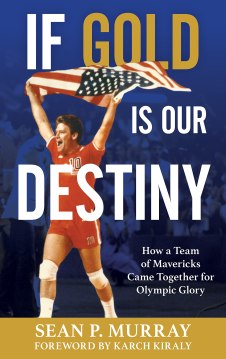Any examination of the history of volleyball in the USA cannot help but conclude that the men’s national team winning gold in the 1984 Olympics was a major turning point. Not long after it happened, that team’s head coach, Doug Beal, shared his perspective on the experience in the book Spike! There also a pretty bad movie about it all titled Spiker that’s available on Amazon Prime Video. It includes Beal, Bill Neville, Tony Crabb, and members of the team among the cast, though not in staring roles.
Aside from the stories of those involved – like the ones about the famous/notorious Outward Bound trip – we haven’t had much of an examination of these events beyond Beal’s book, though. Certainly nothing from someone external to events.
That’s no longer the case, thanks to Sean Murray, who’s father was a sports psychologist for the team. After years of work, he’s authored If Gold Is Our Destiny to tell the tale. The book features a foreword from Karch Kiraly, who also helped the USA Women get their first gold medal. One of the things that struck me from Karch’s contribution was how even he gained some new insights after all these years.
No tale of Olympic gold is of any merit without the backstory, and Murray definitely provides that. The book takes the reader back to the 1960s and early ’70s. That’s when the likes of Jim Coleman and Carl McGown were leading the USA men. It was a very different situation then. Coaches and players came together for major tournaments (e.g. Olympic qualifications), but that was it. Not until the latter 70s is there a full-time, year-round national team program like others in the world had at the time.
The book does a good job of sharing the trials and tribulations of that period. And there were a lot of them! Younger readers won’t realize how much of a split there was between players from California and the Midwest. It was big! That played out in a number of ways in this time period, as Murray shows us. And, of course, there were your usual other organizational, coaching, and team challenges.
All of this leads into preparation for the ’84 Games in Los Angeles. The team failed to qualify for ’80 (though the women did), so even though the US boycotted those Games, there was a major feeling that things needed to change significantly. Those four years are the big focus of the book.
It probably won’t come as much surprise that Beal is central in the telling. As head coach…
Click Here to Read the Full Original Article at Coaching Volleyball…

